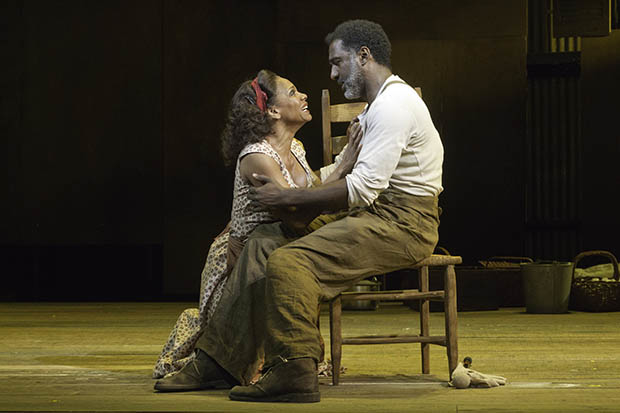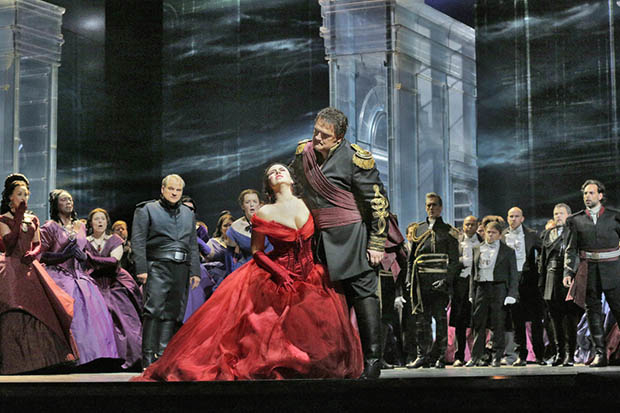Hungarian State Opera Asks White Performers to Claim Black Identity for Porgy and Bess
A state-funded opera company tests the limits of self-identification in its unauthorized production.
Marcell Bakonyi and Orsolya Sáfár, our #PorgyandBess 2nd cast at the press conference. #Gershwin #opera #newproduciton #notallblackcast #operabudapest pic.twitter.com/ZW6RnAKFyd
— HungarianStateOpera (@OperaBudapest) January 17, 2018
This past week, the Hungarian State Opera gave three performances of Porgy and Bess, with three more slated for the coming week. Hungarian fans of the Gershwin opera about black South Carolinians might be surprised by the casting choices in this production: Outwardly, the performers all appear to be white. This is in direct violation of the wishes of the Gershwin estate, which stipulates the hiring of black performers for all productions of Porgy and Bess. How did this happen?
Story of the Week will explain the conflict around the Hungarian Porgy and Bess and the extraordinary measures the company has taken to perform the opera, including asking members of the cast to sign a form claiming African-American identity.
What is Porgy and Bess?
Composed by brothers George and Ira Gershwin, with a libretto by DuBose Heyward, Porgy and Bess is about a community of black folks living and dying on the waterfront in Charleston, South Carolina. It debuted in Boston in 1935 before moving to Broadway. Since then, it has been embraced by the opera world in a way no other American property has. Numbers like "Summertime" and "I Loves You, Porgy" serve simultaneously as standards of the great American songbook and timeless arias. Like so much of George Gershwin's work, Porgy and Bess bridges the divide between jazz and classical music. It's not surprising that the Hungarian State Opera would want to include this significant piece in its repertoire.

(© Michael J. Lutch)
What is the problem with staging Porgy and Bess with an all-white cast?
The primary issue with this production is that it goes against the wishes of the Gershwin estate, which insists that the late composers wanted black performers in Porgy and Bess. This is likely born in part out of a desire to convey authenticity: The United States has a long and fraught history of blackface minstrelsy (white performers playing black characters in derogatory ways), and the Gershwins wanted to completely reject that. Porgy and Bess was not written to mock black Americans, but to feature their lives and voices in the operatic form. There is also the desire to provide more employment opportunities to black artists, who have historically been limited by a lack of specifically black roles in the opera canon.
Hungarian State Opera general director Szilveszter Ókovács bristles at the estate's casting requirement. He claims that the contract he signed for the 2018 debut of this production contained no clause stipulating the race of the performers (that production has since been added to the company's repertoire).
The 2018 run of Porgy was ultimately allowed to continue, but the Gershwin estate insisted that a disclaimer be added to the program stating, "The manner in which this production is being produced is unauthorized and is contrary to the requirements for the presentation of the work." The company then added this disclaimer to its advertising, almost like a favorable pull-quote from a review. A year later, a spokesman for Tams-Witmark, the licensing agent that handles Porgy and Bess, told the New York Times that the license has expired and the company is now performing without one.
Ókovács has taken an unusual additional step for this renegade production: According to the Hungarian news site Index.hu, he has asked all of the performers to sign a paper that reads, "I, the undersigned, hereby state that African-American origin and consciousness are integral parts of my identity. Because of this I am especially glad to be able to perform in George Gershwin's opera, Porgy and Bess." This is almost certainly untrue for the vast majority of the cast, but Ókovács claims ignorance of the actors' backgrounds.
"There is no public registry of skin color in Hungary," Ókovács told Hungarian broadcaster ATV, "and I can't really say about the cast if it meets or not the requirement, so I'd rather ask them." When Index.hu pressed Ókovács for further comment, he responded with a series of 22 questions challenging the quantifiability of race and suggesting that such casting requirements are discriminatory.

(© Ken Howard/ Metropolitan Opera)
In an earlier statement to the press, Ókovács also complained of the impossibility of finding black performers in Europe to fulfill the requirement of the Gershwin estate. Casting challenges around race are not unknown in opera: The Metropolitan Opera ended the practice of performing Otello in blackface in 2015, but it still mostly employs white performers in the role (one of the most challenging tenor roles ever written).
But Porgy and Bess isn't Otello. It exists on the border between opera and musical theater, and black performers from both disciplines have sung it beautifully, including in a 2012 Broadway revival. Additional productions have been mounted in Berlin in 2012, Geneva in 2015, Milan's La Scala in 2016, and London in 2018 — all featuring black performers in the leading roles. Presumably, a major international institution like the Hungarian State Opera would be able to hire-in black performers just as these companies have, especially since Hungary enjoys the freedom of movement afforded by the European Union. At best, the decision to go for an all-white cast looks like laziness and stinginess masquerading as a principled stand. At worst, it's something far more cynical.
How does this behavior benefit the Hungarian State Opera?
The venue for Porgy and Bess offers a hint: Originally known as "the People's Opera," the Erkel Theatre is the largest opera house in Hungary. It was renovated in 2013 at the behest of Viktor Orbán, Hungary's authoritarian Prime Minister, who views opera as vital to Hungary's cultural identity. Orbán's government has allocated an additional $170 million for the renovation of the State Opera's primary venue and the construction of a third space; both projects are currently underway.

(© Kremlin.ru)
Orbán's Fidesz Party is anti-immigration, highly skeptical of the European Union, and fearful of what it sees as creeping cultural change. Certainly, the spectacle of an all-white company staging the work of a Jewish-American composer (rather than hiring black performers, as that composer intended) will look like a bold act of defiance to those who buy into "replacement theory."
Ókovács's request that his performers self-identify as African-American looks like a further dig at increasingly widespread legislation that allows individuals to self-identify their gender in order to change it on their birth certificate. Transgender rights campaigners have lauded these measures, but Fidesz and other right-wing parties in Europe have taken a dim view of progressive attitudes about gender. If people can decide their own gender, the counterargument goes, what is to keep them from deciding their own race?
By seeming to troll the liberal establishment, Ókovács and the Hungarian State Opera can continue to expect praise and hope for lavish funding from the Orbán government — and the artists who were asked to sign Ókovács's identity statement will have to decide if they want to be complicit in that.







